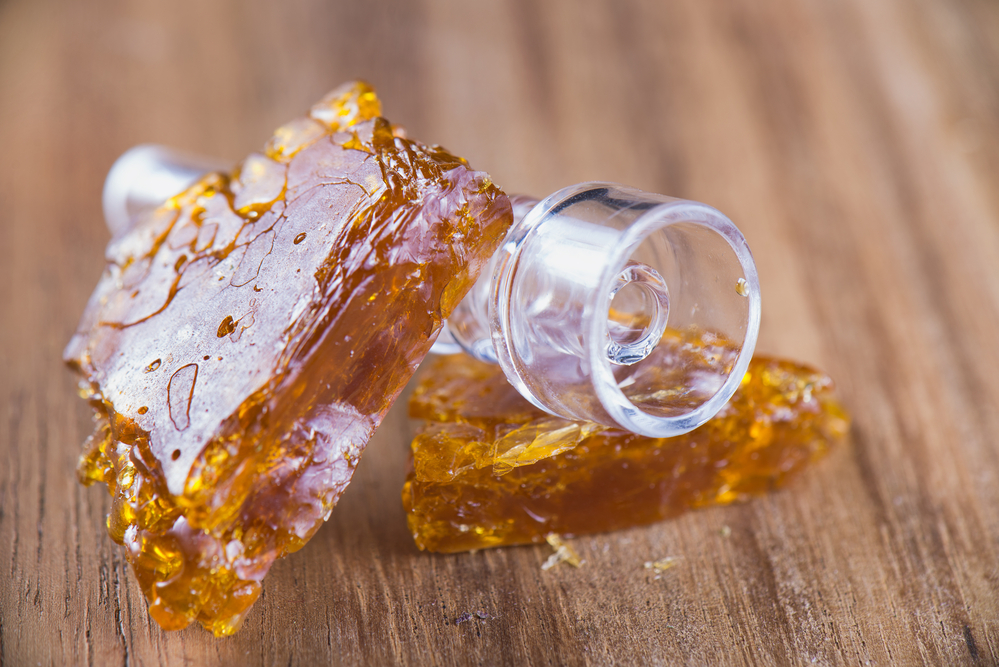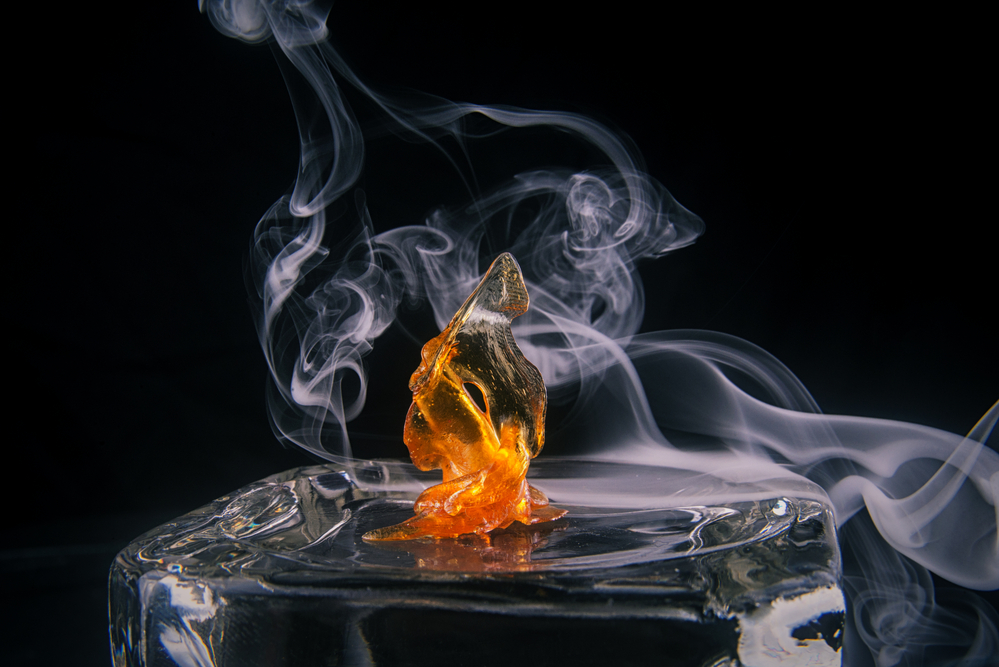
The first front of the battle for the legalization of cannabis concentrates was to legitimize the therapeutic benefit and use of marijuana for patients. At the time of writing, there are 34 states that have legalized medical marijuana. And many states are developing the groundwork legislation to launch medical marijuana programs in 2021 and 2022.
After legalization was won at the state level, the next issue was the potency of cannabis products. Concentrates are currently legalized in 24 out of 34 states (as of September 2020). Some states hastened to establish a cap of potency for any medical marijuana product, as a safety measure. That included whole flower (bud), edibles (where legalized), and concentrates.
The purpose of providing medical marijuana is to give patients with moderate to severe and debilitating health conditions another option for symptom management. Many patients that become registered to use medical marijuana have not been successful at moderating symptoms through prescription medications. And for some, cannabis concentrates have become a lifeline that has removed barriers to qualify of life.
While concentrated cannabis products are not legalized in every state there are some jurisdictions that are facing a new legislative front. The medical cannabis industry and advocates for access to therapeutic cannabis for compassionate care are fighting to prevent low THC caps on concentrates.
In 2019, House lawmakers in Washington State moved wrote HB 2546. The law would cap cannabis concentrates for sale at medical and adult-use dispensaries at a maximum of 10% THC. A companion bill HB 6332 was also read by the House Committee. Both Bills were sponsored by Senator Jesse Saloman, of the 32nd District.
Senator Saloman shared that some concentrates had been measured at 100% THC. Some types of concentrates like Bubba’s Deadhead Girl have been measured at 79%. Another high THC concentrate Dandy’s True OG may be one of the most potent THC concentrates available. Dandy’s True OG measures at an average of 82% THC.
Activists for access to stronger potency cannabis for patients opposed both HB 2546 and the companion Bill HB 6332. It was shelved for the duration of 2020 by the Washington House.
The HCR 2045 Bill in Arizona moved to limit the potency of THC in all medical cannabis to a maximum of 2%. The average potency of most medical cannabis products can range from 12% to 25%. Patients with chronic pain do not always resolve their symptoms. For many, cannabis concentrates can make the pain more tolerable. And allow them to function better on a daily basis.
Bill HCR 2045 would have also required every medical cannabis product to be labeled with a Surgeon General’s warning about consuming smokable products. The language of the proposed legislation was also confusing; people were not sure whether it related only to concentrates or all products.
HCR 2045: Introduced by Representatives Bowers: Biasiucci, Bolick, Carroll, Cobb, Cook, Finchem, Griffin, Lawrence, Lieberman, Nutt, Osborne, Thorpe, Toma, Udall.
“A registered nonprofit medical marijuana dispensary may not dispense to a qualifying patient or a designated caregiver medical marijuana with a tetrahydrocannabinol concentration of more than two percent.”
A 2% potency level is low. Too low to help some patients, which would diminish the purpose of Arizona’s medical marijuana program. In Arizona, there is no established legal limit to the potency of medical cannabis. And many wellness experts feel that is appropriate.
In the state of Florida, THC is limited to a maximum of 10% potency for registered patients who are younger than the age of 21 years. The only exception to the proposed legislation was for minors who were terminally ill. Compassionate care legislation would permit (at the doctor’s discretion) a higher THC amount for a child in a hospice stage of care.
But when Jose Oliva (the Speaker of the House in Florida) championed universal THC caps (for all patients regardless of age) the Florida Senate did not completely agree. Oliva was however successful at maintaining the cap of 10% on THC products for minors.
One of the inherent problems that cannabis industry experts in Florida have presented, is sending patients to the black market. If licensed (and inspected) dispensaries in Florida were legally able to provide only low THC products, it would contribute to the growth of illicit black-market sales. Patients who need a more potent therapeutic dose would turn back to illegal sources.
The need for symptom relief for patients with moderate to severe, or terminal illnesses can be greater than 10% cannabis concentrates potency levels. If patients who desperately need alternative pain management cannot get the strength of cannabis they need will resort to other measures. And that can also include shopping for and transporting cannabis illegally from another state. Reciprocal state MMJ agreements and temporary 30-day patient cards can increase the problem.

No one wants to subject a minor to detrimental health effects. Least of all a parent or legal guardian caregiver. To assume that a caregiver would make a decision that could harm the patient is beyond unfathomable. But there are legitimate concerns about compassionate care circumstances where a patient may be exposed to more cannabis than they require. To the extent that it creates a new health risk for the minor.
Three studies that support caution and cannabis concentrates potency caps for minors that are most often referred to in legislative debate are:
1. The Association between Cannabis Product Characteristics and Symptom Relief
Stith, S.S., Vigil, J.M., Brockelman, F. et al. The Association between Cannabis Product Characteristics and Symptom Relief. Sci Rep 9, 2712 (2019). https://www.nature.com/articles/s41598-019-39462-1#citeas (Article)
2. Is the medical use of cannabis a therapeutic option for children?
Michael J Rieder and Canadian Paediatric Society, Drug Therapy and Hazardous Substances Committee (Article)
3. Changing Your Mind: Marijuana and the Brain
Bertha K Madras, Ph.D. Professor, Psychobiology Department of Psychiatry Mclean Hospital Harvard Medical School (Presentation)
The presentation of Dr. Bertha K Madras was particularly impactful for the Office of Medical Marijuana Use in Florida. The information was used to pass the 10% THC cannabis cap for minors.
There are also numerous studies that discuss the benefits of higher potency cannabis for hospice or terminal illness patient care (and adolescents). While cannabis can have some detrimental side effects for minors, in a circumstance of a terminal illness diagnosis, the focus is not on long-term effects. The important consideration is the comfort of the patient. This is true for both adults and children with terminal disease diagnoses.
When lower potency cannabis concentrates is the only option for caregivers to provide in compassionate care situations, there is another probable outcome. Increased use.
Denying access to higher potency medical cannabis means that patients are required to use more cannabis, to improve their symptoms. Or help make pain and nausea more tolerable. Patients also find therapeutic benefits that stimulate appetite suppressed by treatments like chemotherapy.
And the benefits (particularly for hospice or chronic care patients) can outweigh the risks when longevity (sadly) isn’t a factor. Cannabis concentrates (at all levels of potency) is a better approach to ensure that patient needs are met.
No Information on MarijuanaDoctors.Com should be used to diagnose, treat, prevent or cure any disease or condition. You can view our Full Disclaimer here.